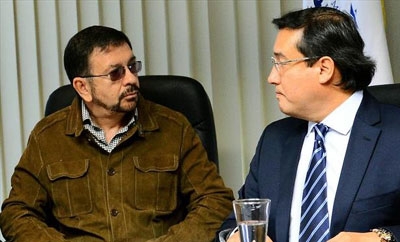An apparent attempt to hinder an investigation into arms trafficking in El Salvador’s army has sparked a harsh exchange of words between government officials and raises questions about what the military may have to hide.
On May 30, military personnel barred members of the Attorney General’s Office from seizing documents as part of a probe into the illegal theft and sale of arms by high-ranking military officials between 2009 and 2013.
El Salvador’s Attorney General Luis Martinez responded angrily to the event, telling Canal 12, “I have never met a more lying and false minister than [Defense Minister] General [David] Munguia Payes,” reported La Prensa Grafica.
Munguia Payes dismissed the comments as “bad manners,” citing a lack of coordination or warning on the part of the prosecutors as the reason for the military blocking their entry.
The investigators had arrived at the military base with a search warrant signed by a San Salvador court, but were expelled from five military garrisons.
InSight Crime Analysis
There have long been reports of El Salvador’s security institutions being infiltrated by organized crime up to the highest levels. Arms scandals, in particular, have stained the legitimacy of the armed forces, with both active and retired personnel accused of selling military weapons illegally.
SEE ALSO: Coverage of Arms Trafficking
Defense Minister Munguia Payes has skirted around the issue in the past. While admitting in 2011 — during his last stint as defense minister — to weapons being stolen from security forces in El Salvador and around the region and sold to Mexican cartels, he failed to address the idea this theft was being carried out by military officials on the inside.
The exchange between Munguia Payes and the attorney general indicates that inter-institutional tensions may have had a hand in the recent expulsion of prosecutors from the military installations. However, the history of the armed forces also raises questions about the real motives behind the blockade — which appears to have been an attempt to stall judicial investigations — and about why the defense minister was so quick to defend it.

